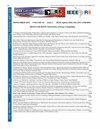Analysis of Kinetic Energy Recovery System Based on Four-Phase Interleaved Buck Converter for Vehicle Verification Processes
IF 1.3
4区 工程技术
Q3 COMPUTER SCIENCE, INFORMATION SYSTEMS
引用次数: 0
Abstract
The automotive industry consumes large amounts of fossil fuels during vehicle acceleration and braking tests as part of quality verification. The kinetic energy generated in the test rollers is typically wasted during vehicle braking. One approach to reducing vehicle production costs and improving the efficiency of fossil fuel consumption is to recover a fraction of this energy using a system that does not interfere with vehicle verification standards. The recovered energy can be stored or used for other essential functions, such as powering lighting systems. In industrial processes, electrical energy is the most common form of energy recovery due to its advantages in storage, distribution, and transformation for various applications. This paper presents the analysis of a kinetic energy recovery system (KERS) based on a four-phase interleaved Buck converter for vehicle testing processes. A stage by stage analysis of the energy recovery system is provided, along with the selection of system parameters. Furthermore, the advantages of the proposed topology and the experimental results are discussed.基于四相交错Buck变换器的车辆验证过程动能回收系统分析
作为质量验证的一部分,汽车行业在车辆加速和制动测试过程中消耗大量的化石燃料。在测试滚筒中产生的动能通常在车辆制动过程中被浪费掉。降低车辆生产成本和提高化石燃料消耗效率的一种方法是使用一种不干扰车辆验证标准的系统来回收一小部分能源。回收的能量可以储存起来或用于其他基本功能,例如为照明系统供电。在工业过程中,电能是最常见的能量回收形式,因为它在存储、分配和各种应用的转换方面具有优势。本文介绍了一种基于四相交错Buck变换器的汽车测试过程动能回收系统。对能量回收系统进行了逐级分析,并对系统参数进行了选择。此外,还讨论了该拓扑的优点和实验结果。
本文章由计算机程序翻译,如有差异,请以英文原文为准。
求助全文
约1分钟内获得全文
求助全文
来源期刊

IEEE Latin America Transactions
COMPUTER SCIENCE, INFORMATION SYSTEMS-ENGINEERING, ELECTRICAL & ELECTRONIC
CiteScore
3.50
自引率
7.70%
发文量
192
审稿时长
3-8 weeks
期刊介绍:
IEEE Latin America Transactions (IEEE LATAM) is an interdisciplinary journal focused on the dissemination of original and quality research papers / review articles in Spanish and Portuguese of emerging topics in three main areas: Computing, Electric Energy and Electronics. Some of the sub-areas of the journal are, but not limited to: Automatic control, communications, instrumentation, artificial intelligence, power and industrial electronics, fault diagnosis and detection, transportation electrification, internet of things, electrical machines, circuits and systems, biomedicine and biomedical / haptic applications, secure communications, robotics, sensors and actuators, computer networks, smart grids, among others.
 求助内容:
求助内容: 应助结果提醒方式:
应助结果提醒方式:


